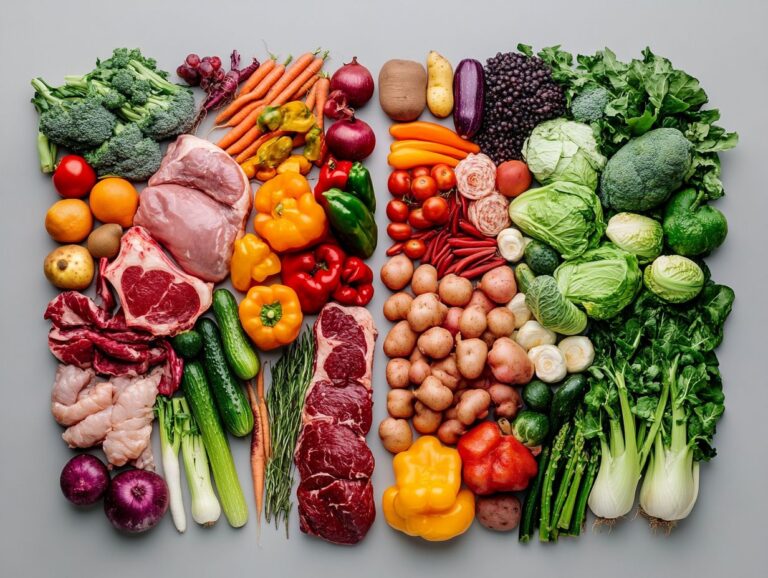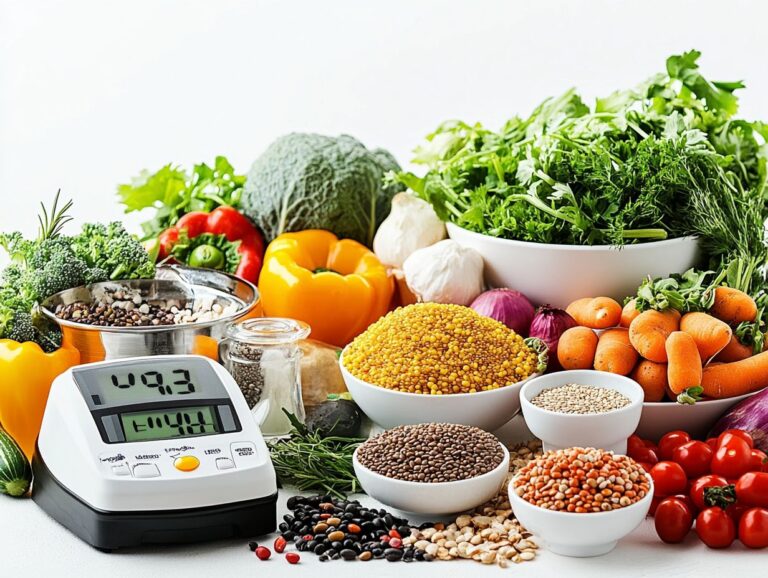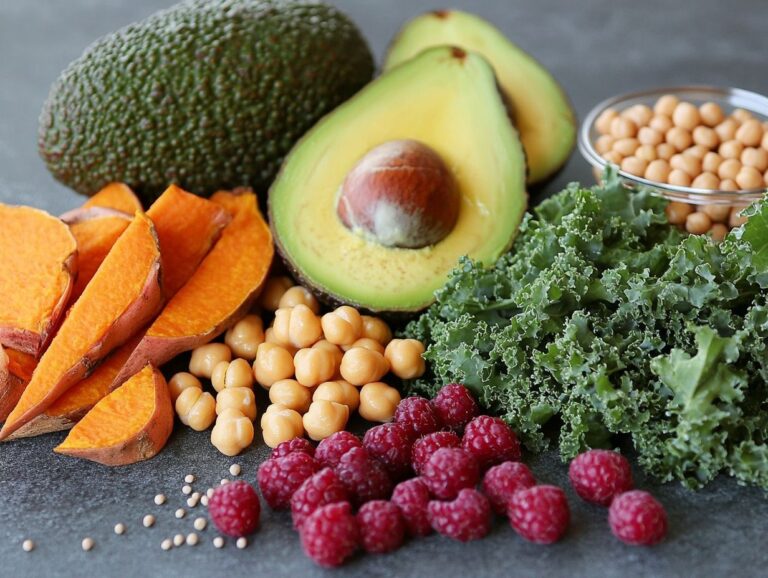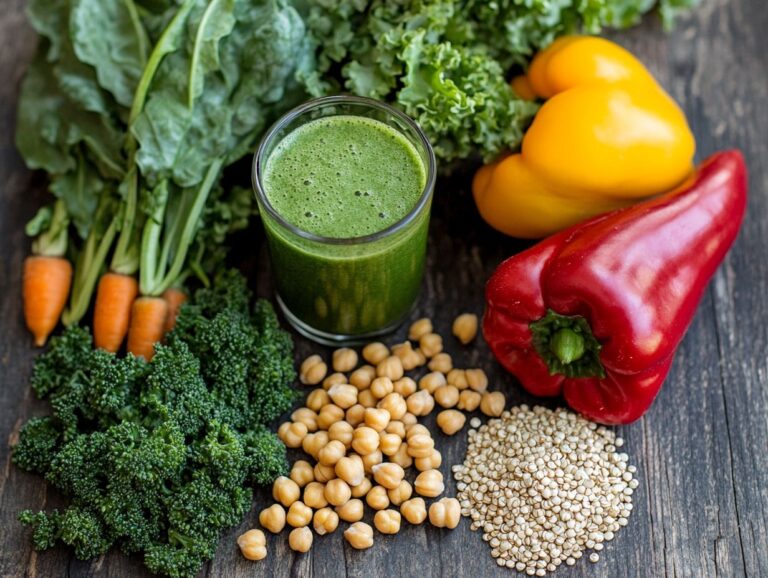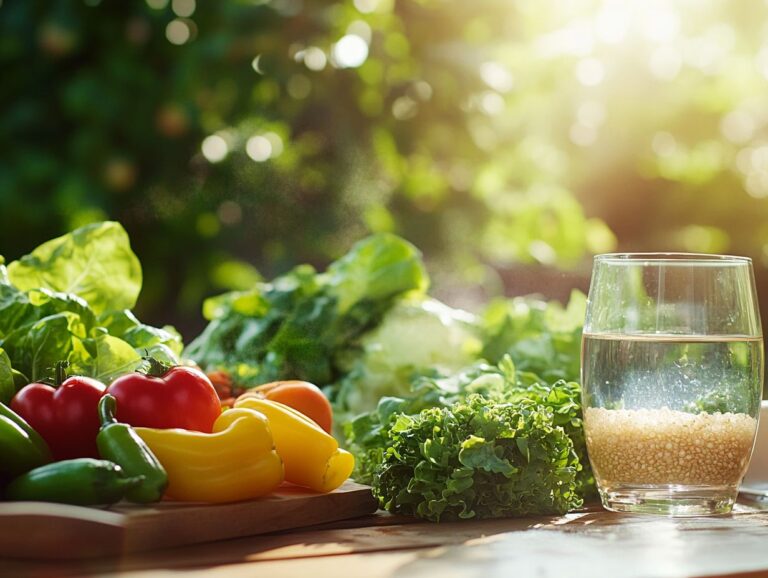A vegan liquid diet consists solely of plant-based liquids and represents a distinct form of nutrition. This type of diet can be utilized for various purposes, including weight loss, improving digestive health, or detoxification, while also being both nourishing and cleansing. Many individuals are turning to vegan liquid diets for their potential benefits, which may include increased nutrient intake and enhanced digestion. However, there are also risks associated with inadequate nutrition and potential energy loss. This article will explain what a vegan liquid diet entails, along with its benefits and risks, and provide guidance on how to begin a vegan liquid diet.
Key Takeaways:
- A vegan liquid diet involves consuming only liquids, primarily from fruits, vegetables, and plant-based proteins, such as those found in vegan food options like soy milk and tempeh.
- This diet may lead to improved digestion, weight loss, and detoxification, but it can also cause nutrient deficiencies and low energy levels.
- Before starting a vegan liquid diet, consult with a healthcare professional, plan your meals, and stock up on nutrient-dense foods. Avoid processed foods, sugary drinks, and animal products on this diet.
What Is a Vegan Liquid Diet?
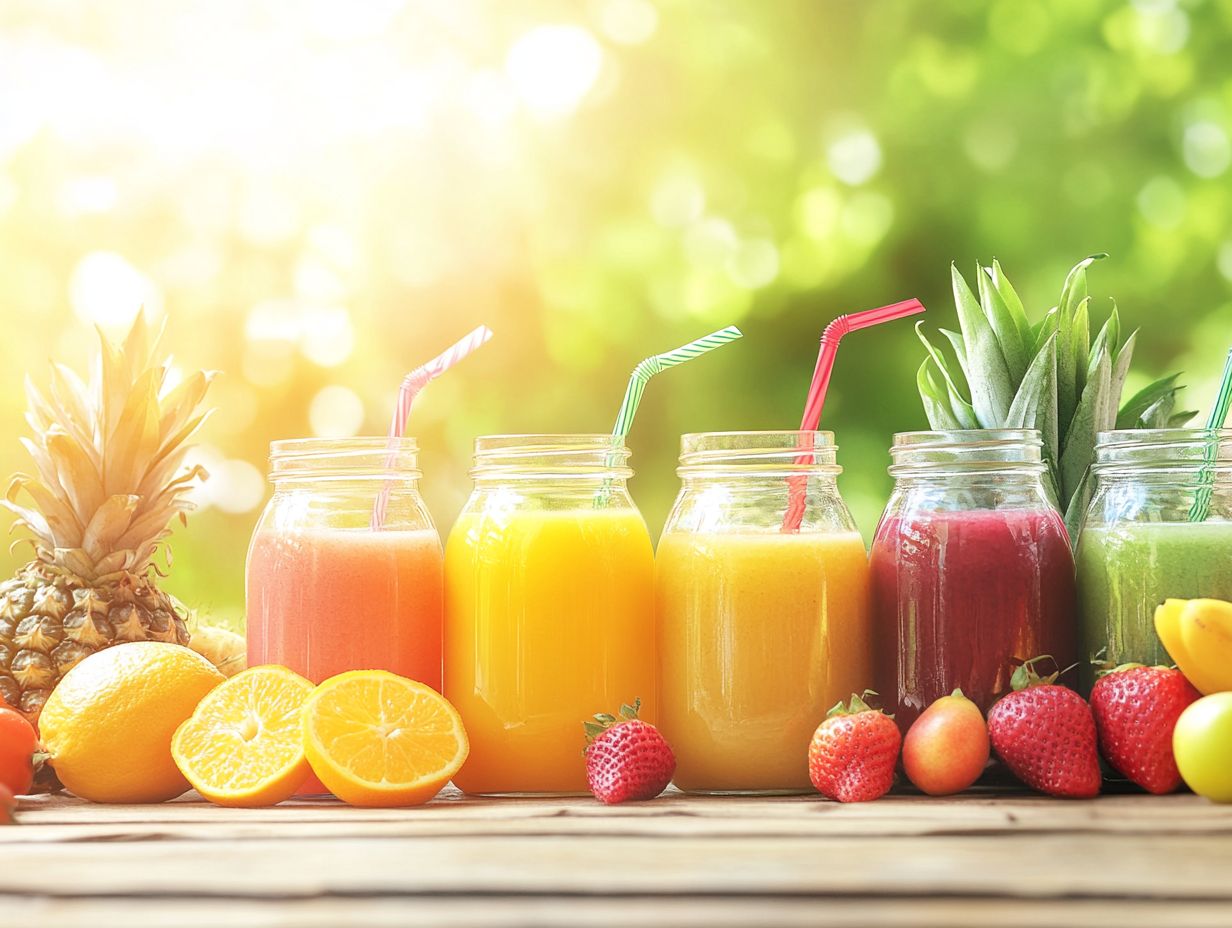
A vegan liquid diet is a specific type of liquid diet that consists of meals made from whole foods, primarily featuring plant-based ingredients while excluding all animal products, aligning with dietary vegan principles.
These liquid meals emphasize nutrient-dense components, such as smoothies, soups, and beverages enhanced with nutritional yeast for added flavor and nutrition. This diet may be beneficial for individuals with certain health issues, dietary restrictions, or during a hospital stay.
Therefore, it is essential to collaborate with a registered dietitian for personalized meal planning and guidance.
Why Do People Choose a Vegan Liquid Diet?
Individuals choose a vegan liquid diet for several reasons, including the health benefits associated with this eating style, ethical considerations related to veganism, and the desire to reduce their carbon footprint through sustainable eating practices.
This type of diet offers a structured meal plan that can be customized to meet an individual’s specific health needs while still providing comfort foods in liquid form.
What Are the Benefits of a Vegan Liquid Diet?
A vegan liquid diet offers numerous benefits, which is why many people choose this eating style to improve their health.
By focusing on nutrient-rich liquids derived from a diverse range of fruits and vegetables, vegan liquid diets can enhance digestion, promote weight loss, and aid in detoxifying the body.
This approach encourages the intake of essential nutrients, providing the body with the vitamins and minerals it needs while adhering to a plant-based eating style.
1. Improved Digestion
A vegan liquid diet promotes digestion by focusing on whole foods, fruits, and vegetables, including leafy options like broccoli, which provide essential fiber and nutrients vital for gastrointestinal health.
This type of diet emphasizes high-fiber ingredients such as leafy greens, nuts, and seeds, which support regular bowel movements and help reduce constipation.
The hydration aspect should not be overlooked; incorporating smoothies and juices into daily meals not only aids in nutrient absorption but also helps maintain proper fluid levels in the body.
The combination of fiber and hydration creates a favorable environment in the gut for the growth of healthy gut flora, which is fundamental for breaking down and absorbing important nutrients.
Additionally, antioxidants found in colorful fruits can help counteract oxidative stress in the intestines, further supporting digestive health.
2. Weight Loss
Another significant benefit of a vegan liquid diet is its potential to aid in weight loss. Liquid meals can serve as low-calorie meal replacements while remaining nutrient-dense.
Vegan liquid diets that include vegetable, fruit, and plant protein-based smoothies, soups, and juices offer satisfying meal options that can help create the caloric deficit necessary for weight loss. The high fiber content in many of these ingredients promotes a feeling of fullness more quickly, reducing the likelihood of overeating.
Typically, a vegan liquid diet emphasizes whole, unprocessed foods that provide essential vitamins and minerals and support metabolism regulation. Furthermore, this diet encourages mindful eating habits by emphasizing nutrients over mere calorie counting, making it a healthier approach for those looking to improve their overall health and lose weight.
3. Detoxification
A vegan liquid diet supports detoxification by promoting whole foods and a diverse selection of fruits and vegetables that facilitate natural cleansing. Nutrient-dense ingredients such as leafy greens, citrus fruits, and colorful berries help the liver, kidneys, and digestive system eliminate toxins.
Leafy greens like kale and spinach are rich in chlorophyll, which assists in neutralizing heavy metals and other harmful substances. Citrus fruits supply the body with vitamin C, enhancing immune function.
Beets and apples contribute essential fibers and antioxidants to a vegan liquid diet, supporting gut health and promoting regular bowel movements, both of which are crucial for waste elimination.
Overall, a well-balanced vegan liquid diet not only aids in detoxification but also offers a variety of health benefits that can enhance quality of life.
4. Increased Nutrient Intake
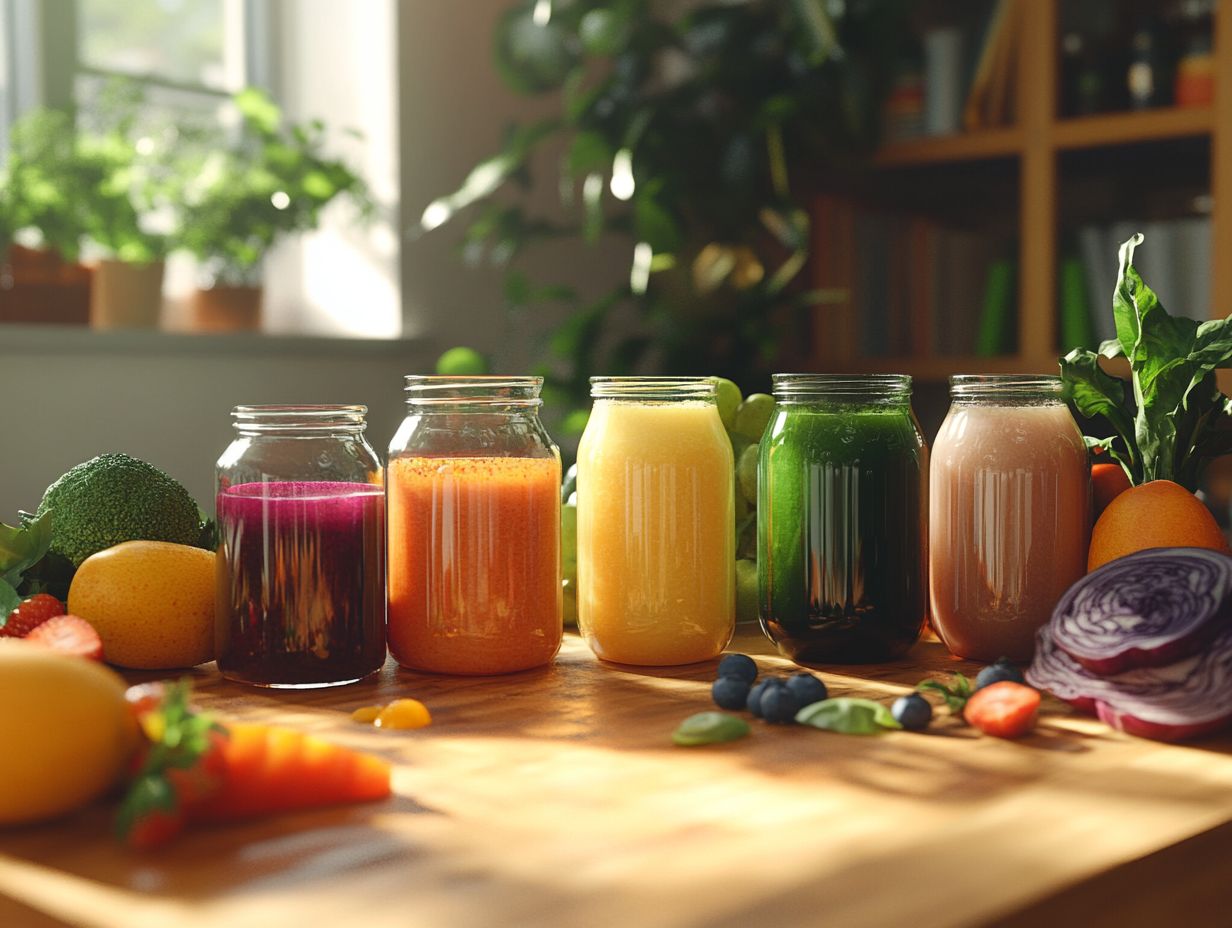
A vegan liquid diet is rich in nutrients due to its inclusion of a diverse array of vitamins and minerals sourced from plant-based ingredients.
What Are the Risks of a Vegan Liquid Diet?
A vegan liquid diet offers numerous benefits; however, it also carries risks, particularly the potential for nutrient deficiencies if not carefully planned.
1. Nutrient Deficiencies
Nutritional deficiencies, particularly in essential vitamins and minerals such as Vitamin B12, calcium, iron, and Omega-3 fatty acids, pose a significant risk for individuals following a vegan liquid diet. These nutrients are crucial for maintaining energy levels, bone health, and the proper functioning of bodily processes.
For instance, Vitamin B12 is necessary for nerve function and the formation of red blood cells. Calcium, found in calcium-rich foods like fortified soy milk, is vital for maintaining healthy bones and preventing osteoporosis. Iron is essential for oxygen transport within the body, and its deficiency can lead to fatigue and anemia. Omega-3 fatty acids, present in seeds like chia and hemp, are important for heart health and brain function.
Participants in a vegan liquid diet should consider using fortified foods or supplements to address these deficiencies and strive to consume a diverse array of fruits, vegetables, nuts, and seeds that are rich in these nutrients on a daily basis.
2. Low Energy Levels
Low energy levels can be a significant drawback of a vegan liquid diet, particularly if it consists of low-calorie meals made from a limited variety of highly nutritious ingredients. This restriction may lead to feelings of fatigue, making tasks that are usually easy to accomplish feel tiring or more challenging.
To address this issue, it is important to consciously incorporate a wider variety of whole foods into liquid meals. For instance, blending in fruits, vegetables, nuts, and seeds can greatly enhance the nutritional profile of these meals. Furthermore, adding ingredients that are high in healthy fats, such as avocados or nut butters, can increase the calorie density of the diet, helping individuals maintain their energy levels throughout the day.
Preparing meals in advance can also ensure that nutrient-rich options are readily available, thus reducing the temptation to resort to less nutritious foods and supporting adherence to dietary needs.
3. Loss of Muscle Mass
A potential risk associated with a vegan liquid diet is the loss of muscle mass, which can occur if the diet lacks sufficient protein sources to meet dietary needs.
When the body does not receive enough protein, it may start to utilize muscle tissue for energy, leading to a decrease in muscle strength and function. This can be particularly concerning for individuals who exercise regularly or are striving to maintain their physical fitness.
To mitigate these risks, it is crucial to include a variety of plant-based protein sources in the liquid diet. Options such as:
- Lentil protein powder
- Hemp seeds
- Chia seeds
not only offer protein but also provide essential building blocks for healthy muscle maintenance and recovery, ensuring that dietary needs are met even within a vegan framework.
How to Start a Vegan Liquid Diet?
Before starting a vegan liquid diet, it is essential to consult with a healthcare professional or registered dietitian to ensure that the diet meets your nutritional needs and health goals, adhering to dietary guidelines.
1. Consult with a Healthcare Professional
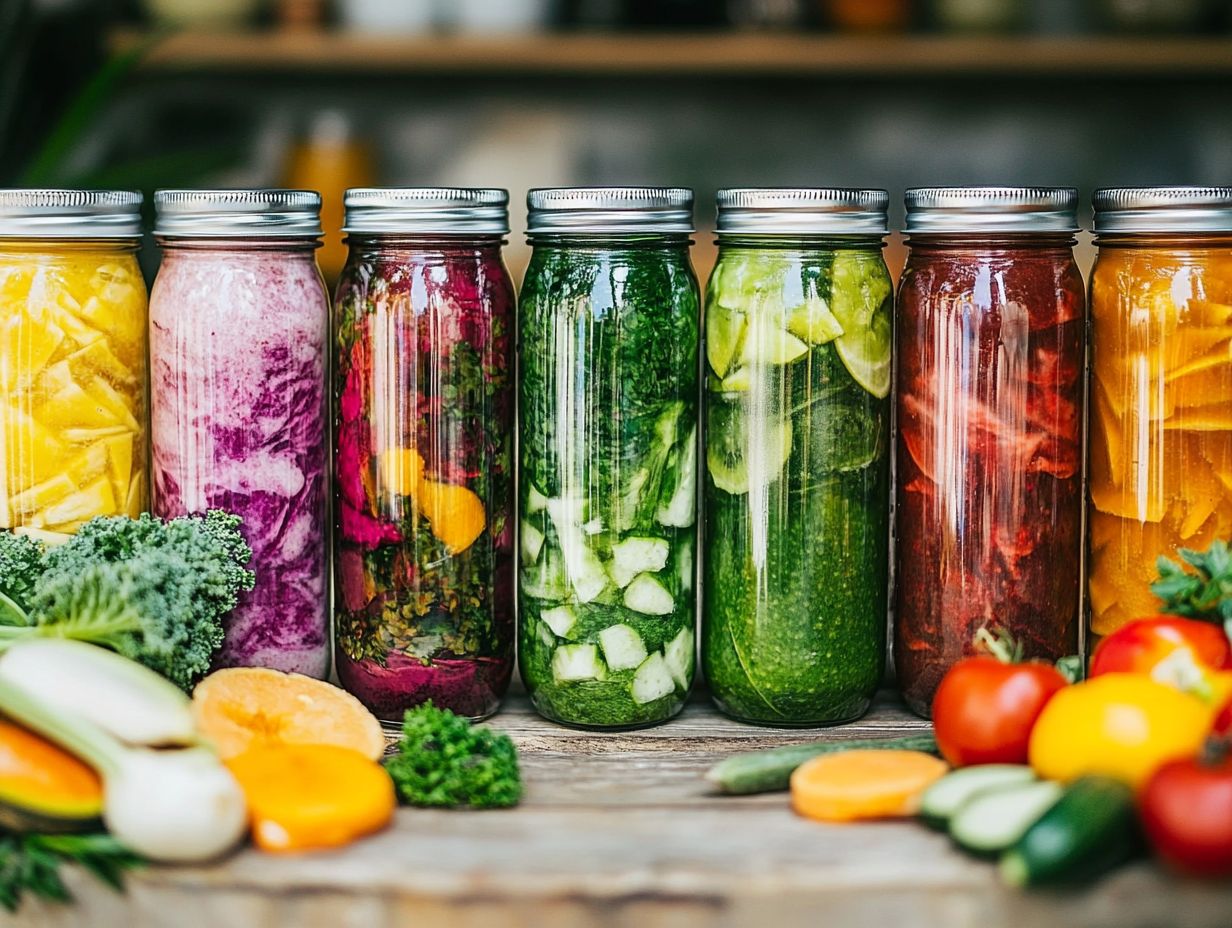
Consulting a healthcare professional or registered dietitian should be the first step when considering a vegan liquid diet to ensure it meets specific dietary needs and health goals. These professionals have the expertise to create dietary plans that align with nutritional requirements and promote overall wellness.
To find the right healthcare provider, consider their qualifications, experience with plant-based nutrition, and communication skills. Potential clients should feel free to ask questions about meal planning, including:
- How to ensure adequate protein intake
- What supplements may be necessary
- How to balance macronutrients
Understanding the provider’s rationale can help tailor the plan to address individual health issues effectively.
2. Plan Your Meals
Planning your meals is essential for the success of a vegan liquid diet, as it allows for a variety of food options while ensuring balanced nutrition. By carefully selecting nutrient-dense ingredients, individuals can create a healthy and well-rounded menu that adheres to dietary guidelines.
It is important to include a diverse range of fruits, vegetables, whole grains, and plant-based proteins in liquid form, such as smoothies and soups that can be easily pureed. Consulting a registered dietitian can also ensure nutritional balance. Meal prepping in advance can save time and reduce the risk of straying from established dietary goals, supporting a healthy lifestyle.
Additionally, incorporating seasonal produce can enhance both flavor and nutrition, making meals more enjoyable and satisfying. Using cooking techniques that emphasize healthy recipes and vegan variants, individuals can foster creativity in their cooking while ensuring adherence to their dietary objectives.
3. Stock Up on Nutrient-Dense Foods
Nutrient-dense foods are essential for a vegan liquid diet, as they form the foundation of your meals and help ensure that you meet your dietary needs, which may include specific nutritional requirements such as iron intake and omega-3 fatty acids.
Varying your selection of fruits, vegetables, and fortified foods will enhance the flavor of your liquids while providing important vitamins and minerals. For instance, leafy greens like spinach and kale are excellent sources of calcium and iron, while berries are rich in antioxidants. Additionally, incorporating nutritional yeast can provide a boost of vitamin B12, crucial for those following a dietary vegan lifestyle.
When selecting these foods, it is advisable to prioritize fresh and organic options, as they typically have lower pesticide residues. Additionally, blending foods into smoothies can significantly enhance the absorption of key nutrients, such as B vitamins and Vitamin C, making it easier for your body to benefit from the healthy ingredients.
What Foods Can You Eat on a Vegan Liquid Diet?
A vegan liquid diet offers a diverse selection of food options and consists of liquid meals prepared from whole foods, including plant-based protein sources and calcium-rich ingredients.
This diet emphasizes a high intake of fresh fruits and vegetables, plant-based protein sources, and healthy fats.
1. Fruits and Vegetables
Fruits and vegetables are essential components of a vegan liquid diet, providing vital vitamins, minerals, and antioxidants that support overall health and well-being. Incorporating a variety of these foods can contribute to improved eating habits and food diversity.
By incorporating a vibrant variety of produce, individuals can enjoy a diverse range of flavors while delivering essential nutrients to their bodies. For example, leafy greens such as spinach and kale are rich in iron and calcium and can be blended into smoothies for a nutrient-dense start to the day.
Meanwhile, fruits like berries and bananas not only add natural sweetness but also provide fiber, which promotes digestive health.
Techniques such as steaming or roasting vegetables before blending can enhance their natural flavors and increase the bioavailability of certain nutrients.
Adding superfoods like chia seeds or avocados can improve the creamy texture and nutrient density of these beverages, making the vegan liquid diet both delicious and beneficial.
2. Plant-Based Proteins
Plant-based proteins are essential components of a vegan liquid diet, as they help meet protein requirements and contribute to overall health. These proteins are vital for those adhering to a plant-based diet, ensuring sufficient protein sources are available.
A variety of plant-based protein sources can enhance the nutritional quality of meals while adding diversity in flavor and texture.
- Legumes, such as lentils and chickpeas, can be blended into smoothies or soups, providing a creamy consistency along with fiber and essential amino acids.
- Nuts like almonds and walnuts can be transformed into nut milk or added to smoothies, offering healthy fats in addition to protein.
- Seeds, such as chia and hemp, are also excellent choices; chia seeds can be soaked overnight to create a thick gel, while hemp seeds can be easily stirred into any liquid dish to significantly boost protein content without altering the taste.
By properly incorporating these ingredients into a daily diet, individuals can ensure adequate protein intake while reaping a variety of health benefits.
3. Healthy Fats
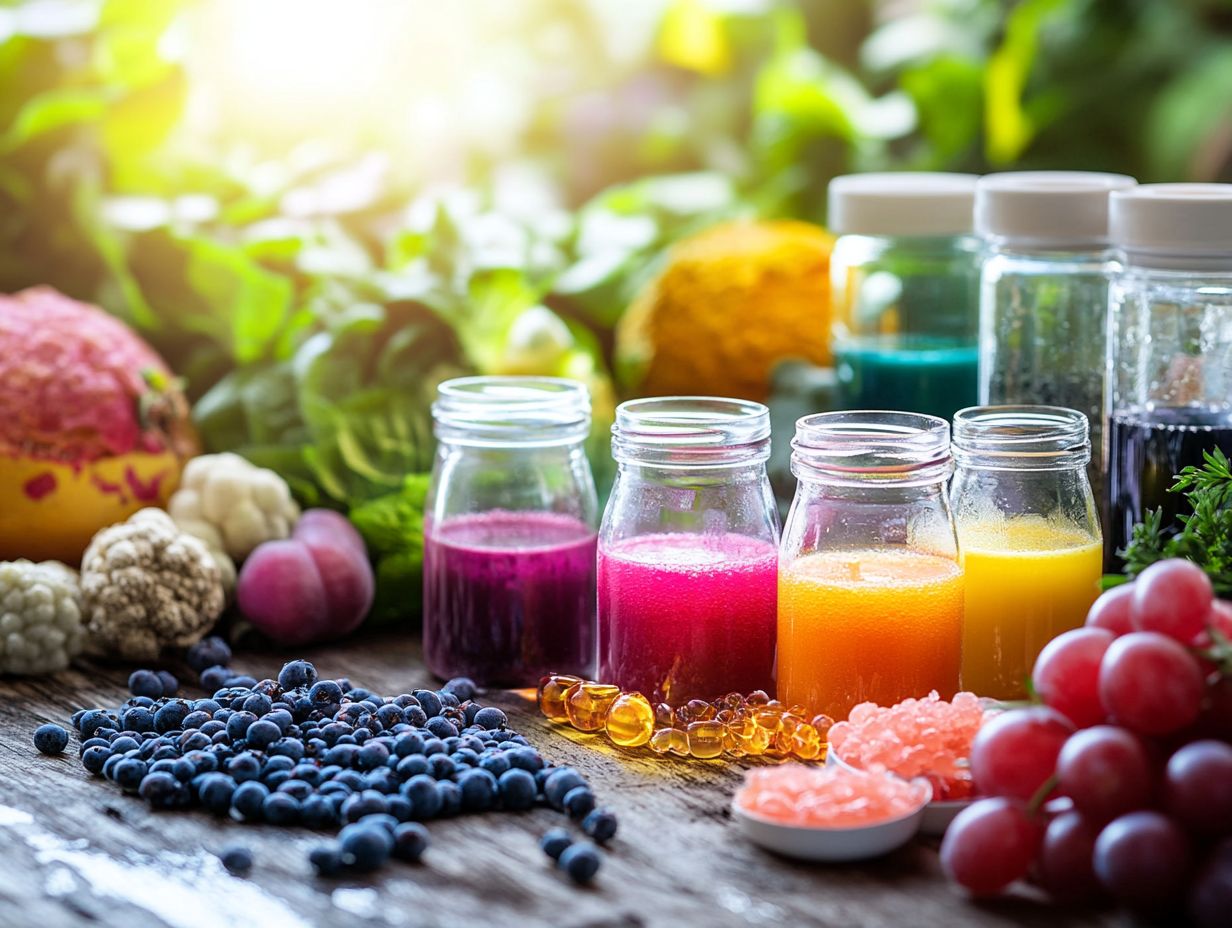
Healthy fats are a vital component of a vegan liquid diet as they provide essential fatty acids that support overall health while enhancing the flavor and consistency of liquid meals. They also play a role in reducing the carbon footprint compared to diets reliant on animal sources.
Their inclusion not only increases the caloric density of the liquid diet but also aids in the absorption of fat-soluble vitamins, which is crucial for maintaining a balanced diet.
Examples of healthy fats include:
- Avocados
- Nuts
- Seeds
These are excellent sources of these beneficial fats and can be easily added to smoothies and soups. For instance, avocados can be blended into creamy smoothies, or whole nuts and seeds can be used to garnish a hearty soup.
To ensure that the diet retains the nutrient-rich properties of these plant-based fats, employ cooking techniques that preserve their nutrients, such as cold-pressing oils or adding raw toppings.
What Foods Should You Avoid on a Vegan Liquid Diet?
On a vegan liquid diet, it is important to avoid certain foods, including animal products and processed foods:
- processed foods
- sugary drinks
- all forms of animal products
1. Processed Foods
Processed foods pose a significant risk for individuals following a liquid vegan diet because they typically lack nutritional value and often contain unhealthy additives. These foods are frequently high in sugars, sodium, and artificial components, which can lead to negative health effects such as inflammation and digestive issues.
For those aiming to maintain a healthy liquid vegan diet, it is essential to focus on whole, natural ingredients that provide important nutrients. Alternatives like freshly prepared juices made from vegetables, leafy greens, fruits, nuts, and seeds can enhance health by supplying essential vitamins, minerals, and healthy fats.
Smoothies incorporating ingredients such as avocado and chia seeds can offer fiber and protein, promoting satiety and overall well-being. By prioritizing whole foods, individuals can ensure a healthy and satisfying liquid vegan diet.
2. Sugary Drinks
Sugary drinks should be avoided on a vegan liquid diet, as they contribute to health risks such as weight gain and increased blood sugar levels. These beverages often contain empty calories and provide little to no nutritional value, making it easier to exceed one’s daily caloric intake without feeling satisfied. Instead, opting for vegan recipes that include natural infusions can enhance flavor without added sugars.
This can be particularly harmful for those trying to maintain a healthy vegan diet that is rich in whole foods and high in nutrients. Relying on sugary sodas or juices may lead to nutrient deficiencies and exacerbate medical conditions such as diabetes and obesity.
Instead, individuals following a vegan lifestyle should opt for healthy alternatives like:
- Infused water
- Herbal teas
- Coconut water
These options not only provide hydration but also important nutrients while aligning with vegan principles.
3. Animal Products
A vegan liquid diet excludes all animal products, adhering to the ethical principles and dietary guidelines of veganism. This diet is rooted in a strong ethical belief in animal rights, which asserts that all beings, including animals, deserve humane treatment. Embracing vegan food options contributes to reducing reliance on animal sources and supports a compassionate lifestyle.
By avoiding animal products, individuals contribute to minimizing animal suffering and promoting a world where fewer animals are raised for food.
A vegan liquid diet offers several health benefits, such as a lower risk of chronic diseases and improved digestion, as it typically emphasizes the consumption of fruits, vegetables, nuts, and seeds that are rich in essential nutrients.
Additionally, the environmental impact of animal farming is a significant factor, as it contributes heavily to greenhouse gas emissions and resource depletion. Adopting a vegan liquid diet not only promotes personal well-being but also encourages sustainable practices that benefit the planet.
How Long Should You Follow a Vegan Liquid Diet?
The duration for which an individual should adhere to a vegan liquid diet can vary significantly and should be tailored to meet their specific health goals and dietary needs. Consulting with a registered dietitian, such as those at the Cleveland Clinic, can provide personalized guidance and ensure nutritional balance.

